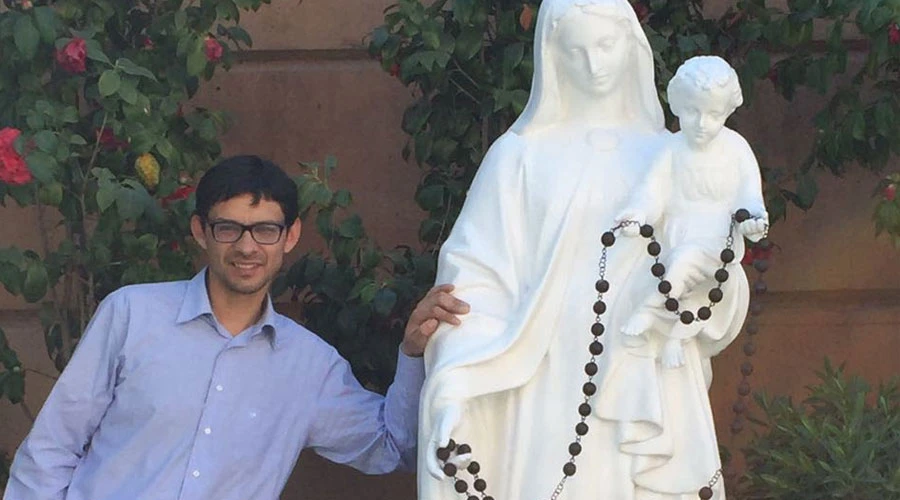
Vatican City, Oct 26, 2017 / 12:53 pm (CNA/EWTN News).- Pope Francis conversed with astronauts orbiting earth on the International Space Station on Thursday, discussing questions as diverse as man’s place in the universe, the fragility of life and the planet, and international cooperation.
“Astronomy makes us contemplate the horizons of the universe and raises questions in us: Where did we come from? Where are we going?” the Pope said.
His first question to the astronauts: “What is your thought on man’s place in the universe?”
Italian astronaut Paolo Nespoli responded, saying that man’s place in the universe is a “complex question,” especially for him since his specialties are in the technical realm.
However, he noted that being in space has helped him to realize that the more humanity learns, the more clearly we can see how much we still do not know.
“I would love for people like you, not just engineers, not just physicists, but people like you (Holy Father) – theologians, philosophers, poets, writers… – to come here in space, and this will surely happen in the future, I would love (for them) to come here to explore what it means to have a human being in space,” he said.
Pope Francis contacted NASA’s International Space Station via a satellite call from the Vatican on Oct. 26. Aboard the space station are a total of six astronauts, including three Americans, two Russians and one Italian, who have been orbiting the earth, about 220 miles away.
Three will return to earth in December of this year, and the other three in February 2018.
Josef Aschbacher, director of the earth observation programs (ESA), told journalists after the call that for the astronauts, speaking with the Pope was an “experience of a lifetime.”
He said the Pope’s questions were all “very interesting” because they have to do with “our life, as humanity.”
For example, Francis asked the team what motivated them to become astronauts, and what they enjoy about being in space.
“Traveling in space modifies so many things that are taken for granted in everyday life, for example the idea of ??up and down,” he said, also asking if there is anything about living in the space station that has surprised them.
American Randolph Bresnik said that what gives him the greatest joy in space is being able “to look outside and see God’s creation maybe a little bit from his perspective. People cannot come up here and see the indescribable beauty of our earth and not be touched in their souls.”
There’s an incredible peace and serenity to our planet when you see it in orbit, he said, and there are “no borders, no conflict, it’s just peaceful.”
He also said that from space you can see “the thinness of the atmosphere, and it makes you realize how fragile our existence here is.”
Pope Francis responded by saying that he loved that answer, how Bresnik had pointed out the earth’s fragility, how it’s a “passing moment,” the earth turning at a rate of 10 km per second.
The astronauts also spoke with Francis about their own diversity and how it is an asset in their work on the International Space Station.
“As we work here on the space station and in our international partnership, we hope that the example of what we can achieve together is an example for all the world and humanity,” Bresnik said.
Francis said that although our society is very individualistic, cooperation is essential in life, asking about examples of collaboration in their work.
The International Space Station is a great example of international collaboration, American Joseph Acaba replied, because the crew members are from different countries and cultures, and they work together, also communicating on a daily basis with control centers in the U.S., Russia, Japan, Canada, and nine different countries in Europe.
“It’s our diversity that makes us stronger,” Acaba said. “And I think we need to embrace who we are as individuals and respect those around us. And by working together we can do things much better than we can as individuals.”
The other astronauts on the call were American Mark T. Vande Hei, and Russians Aleksandr Misurkin and Sergey Ryazanskiy.
The encounter between the astronauts on the space station and the Pope was a fascinating intersection between religion and science, said Aschbacher, noting that science can assist in the search for God through its curiosity to better understand our world.
Science asks some of the same questions as religion, such as, “where we are from and where we are going and where do we live,” he said.
Roberto Battiston, president of the Italian Space Agency (ASI), added that “there is no doubt that science is a way of searching for the truth” and though religion and science may have different ways of searching, they still have the same goal.
Pope Francis’ call marks the second time a pope has contacted astronauts in space. In 2011, Pope Benedict XVI became the first when he called the International Space Station via satellite link, speaking with 12 astronauts for about 20 minutes.
In the call, Benedict asked the astronauts questions about what it is like to view the earth from outer space and if it gave them a new perspective on the importance of promoting peace and caring for our planet’s resources.
 […]
[…]











